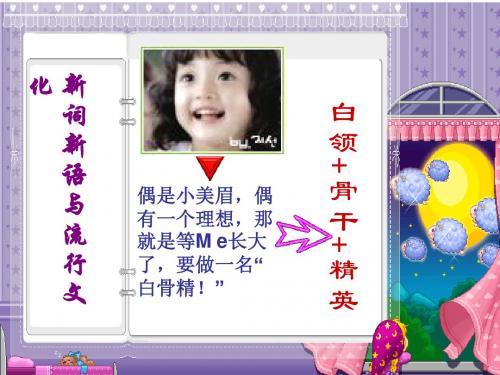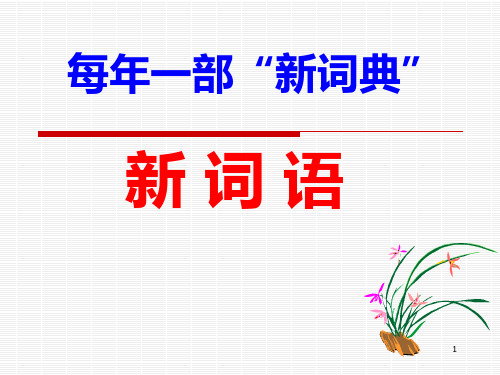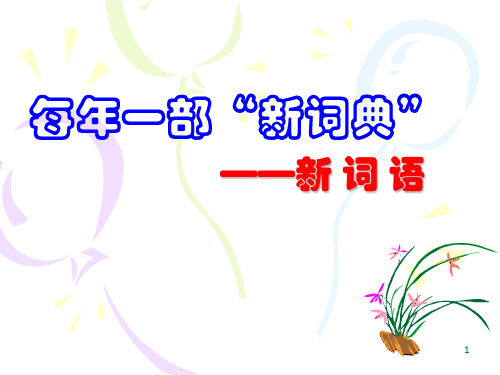新词新译.ppt
- 格式:ppt
- 大小:13.37 MB
- 文档页数:195

汉语新词新译系列-P拼盘演唱会(pin1 pan2 yan3 chang4 hui4)mixed concertThe term "pin pan" means combo platter in Chinese and stands for a concert starring more than one (often a dozen) singer or band. Each will perform a couple of songs in what is usually a commercial or sponsored event.普适计算 (pu3 shi4 ji4 suan4)ubicompIt means a computing model in which information technology is pervasively and seamlessly integrated into the objects and activities that people use in their daily lives.乒乓效应 (ping1 pang1 xiao4 ying4)ping-pong effectA mobile phone owner may find the signal goes bad when standing at the cross-over area of two cellular base stations. That's because the phone is covered by both stations and the wireless connection constantly switches between the two, giving a "ping-pong effect."漂绿 (piao3 lv4)greenwashThis term, a portmanteau of green and whitewash, is often deemed as the unjustified appropriation of environmental virtue by companies, governments, other organizations or politicians to spin their products or policies as environment-friendly.票房毒药 (piao4 fang2 du2 yao4)box office flopThe term refers to a famous actor or actress who demands high payment but more often than not their movies would be a disaster in box office. Hollywood film star Nicole Kidman was once identified as a box office flop by Forbes magazine.爬梯 (pa2 ti1)partyChinese Netizens these days use this term, which literally means"ladder-climbing," as a substitute expression for "party" as the Chinese expression sounds just like the English word.л型人才 (л xing2 ren2 cai2)л-type talentIt is a kind of person that has good command of two fields of professional skills as well as having expertise in management and administration. The two professional skills are the two vertical strokes while the administrative expertise is the horizontal one.泡菜 (pao4cai4)kimchiA possible origin of kimchi or Korean spicy traditional pickled vegetables was in ancient China. Recently, however, China's state food authorities have banned imports of kimchi from South Korea after finding parasite eggs in the imported side dish.拼车 (pin1che1)carpoolWhile carpooling is encouraged in many big cities around the world to tackle rush hour traffic jams and reduce pollution, some Shanghai city government departments recently drew criticism for banning the practice because it disrupted the taxi service market.漂书 (piao1shu1)bookcrossingThe practice of leaving a book in a public place to be picked up and read by others, who then do likewise, has appeared in some districts in the city.飘一族(piao1yi4zu2)drifting generationThose who give up their decent jobs to pursue their career dreams are called the drifting generation. They will move to wherever hope of dream come true is beckoning them. They live on odd jobs, mostly freelance, and live in rented houses, varying from a shabby shed way to a serviced apartment.劈腿(pi1tui3)two-timingThis term is frequently used by young people to describe someone who's not faithful to his/her spouse or lover. But a more popular Chinese saying, jiaota liangtiao chuan, portrays a two-minded person as riding on two boats simultaneously with each foot on one boat. The latter is often used in a broader sense.跑龙套(pao3long2tao4)walk-onThe term originally means a minor role in a theatrical production which usually has no speaking lines. But in daily conversations, it refers to anyone who only plays a bit role such as a utility man or a general handyman in any event, project or business.票友(piao4you3)amateur-prosIn old days, traditional Chinese opera performers were placed on the lower rungs of the social ladder. Some high-class people good at the art only performed as a hobby, rather than a way of eking out a living like professional opera singers. These days, any amateur performers who can beat pros are also referred to as a piaoyou.屏蔽门(ping2bi4men2)metro barrier doorThe city plans to install the barrier doors at 12major stations along the Metro Line 1 by the end of this year to save energy and protect the safety of passengers, particularly during the rush hours.抛绣球(pao1xiu4qiu2)throw an embroidered ballThrowing embroidered satin balls is often seen in games played by young people of minority nationalities in China. Also, a young woman may throw an embroidered ball to a young man at a ceremony as a way to choose a husband. Now it can also be used to mean an opportunity offered by someone or some organization.碰钉子(peng4ding1zi)hit a snag, get snubbedIt's painful to bump into either end of a nail. The Chinese term, meaning literally "bumping into a nail," is often used to describe the situation in which one's plan either hits the wall or gets snubbed. If you are "politely" rebuffed by others, we say you have bumped into a "soft nail."捧杀(peng3sha1)excessive praise, liberal extollmentThe Chinese term is composed of two words "praise" and "kill." When media shower excessive praise upon a person in the limelight, they unintentionally throw obstacles in the way of his or her advancement in career or simply kill their future.碰瓷帮(peng4ci2bang1)porcelain-crashing gangThe Chinese term refers to those who intentionally throw themselves onto or in front of a driving car to get compensation. The term employs the word porcelain because it's fragile and could be costly.拼一族(pin1yi1zu2)the pooling clanUrban young people in China are expanding the carpooling to Go-Dutch-type cost sharing of glossy magazines, pricey dinners, promotion coupons and whatever else they feel is too expensive if they pay alone.炮轰 (pao4hong1)bombard with criticismThe Chinese term, "bombing," is often used figuratively to describe the act of bombarding someone or some organization with criticism.盘点(pan2dian3)elaboration, rundownIt originally means stock counting. But now the term is widely used in the media to mean to cover a certain topic in an exhaustive way or to summarize the overall developments.捧车族(peng3che1zu2)car groomsSome young car owners refrain from using their vehicles whenever a bicycle will do or public transport works just as well. They make the best use of their car rather than abusing them.拍车门 (paichemen)door-tapping robberyPolice said a new form of robbery is on the rise in big cities, where a lot of cars are often trapped in traffic jams every day. Drivers might meet a friendly person knocking on their front doors when they stop at a red light or park beside the road. The person will ask the driver someordinary questions. When drivers are concentrating on talking to the person, accomplice will open the car's backdoor and snatch any valuables in the car.辟情操 (pi1qing2cao1)highbrow chatIt's quite trendy these days for young men and women to find a private place in a teahouse, bar or restaurant to chat casually on highbrow topics such as art, philosophy and human emotions. Sometimes, such talk can become quite chummy.漂婚 (piao1hun1)false marriageIt refers to the kind of extramarital affairs that takes place in a place away from the hometown of both lovers, but it takes on the appearance of a legal marriage.平价时装 (ping2jia4 shi2zhuang1)high-street fashionIt refers to those fashion brands like Zara and H&M that are popular with average-income workers for their trendy design but reasonable prices.拍书族 (pai1shu1zu2)bookstore shutterbugsThis Chinese term refers to people who take pictures of contents of new books in bookshops for their own use. Some even post such materials on the Internet to be shared by others. Now, some local bookstore owners are preparing to sue those people for "book theft."排客 (pai2ke4)paid queuerThis term refers to people who are paid to stand in a queue for others. This is a new service, particularly in the booming real estate market. In some cities, people have to queue up for a long time to buy an apartment. To save time, some buyers hire others, usually migrants from rural areas, to stand in the line for them.苹果派 (ping2guo3pai4)Apple fansThe Chinese term translates literally "apple pie," but it's often used to refer to people who are addicted to Apple's products, such as iPhone, iPod and iTunes.跑酷(pao3ku4)parkourParkour is a new sport inspired by human movement. It focuses on uninterrupted, efficient forward motion over, under, around and through obstacles especially in an urban environment. The goal of parkour is to adapt one's movement to any given obstacle.疲劳驾驶(pi2lao2 jia4shi3)drowsy drivingThe National Highway Traffic Safety Administration of the United States found that 37 percent of drivers admitted to falling asleep at the wheel at least once in their life.陪拼族(pei2pin1zu2)shopping companionThe flip side of love is that the boyfriend or husband of young women who are in the mood to shop has to keep her company all the way round, and might well drop before her shopping drags to a lengthy end.普客(pu3ke4)pook, pocket bookGuo Jingming, a young author good at writing and self-promotion, has published a series of pocket books, which he called "pooks." "Pook" has become a popular publication and a lifestyle among young Chinese readers, most of whom were born in the 1980s or 1990s.拍客(pai1ke4)photo bloggerIt refers to people who take pictures with a digital camera or cell phone and then create Web journals with these photos.排(pai2)supportThe word, which literally means "line up" in Chinese, is widely used by Internet users on bulletin boards to show their support when they agree with someone else's opinion.拼师(pin1shi1)tutor poolingSome young parents in Shanghai try to squeeze academic sessions into their children's vacation by organizing group tutoring to save the cost of hiring a private tutor.平安信(ping2an1xin4)all-is-well noteSome earthquake survivors tried to send out paper slips from cut-off areas to tell relatives they were still alive and safe.破净(po4jin4)below net asset valueStocks that have their closing price fall below their net asset value amid the current sliding stock market.破发(po4fa1)below IPO priceNowadays more and more stocks have seen their closing price on the fi rst day of trading drop below the initial price.排(pai2)agreedAt online chat rooms, Netizens use this Chinese word, meaning literally to queue or line up, to express their agreement to an opinion. It roughly means to get into the queue or stand in the same line as others.抛抛族 (pao1 pao1 zu2)public littersSome spectators at concerts or sports games have adopted the annoying and disruptive habit of littering, extending to even throwing things on stage and court. This behavior tarnishes the image of their city.陪读 (pei2 du2)student guardian/companionIn early times, this term referred to a youngster who was assigned to be a study mate for the offspring of a rich family. Nowadays, it is used to describe anyone who accompanies a child or spouse during his/her study overseas.啤酒眼 (pi1jiu3yan3)beer gogglesThrough a drunken eye, things do look different. Under the influence of alcohol, people tend to choose sex partners they would never prefer while sober. No wonder people say "beauty is in the eye of the beer holder."拍砖(pai1zhua1)knock, pick apartThe term, which literally means "smacking with a brick" in Chinese, is now widely used among Chinese Internet users when they strongly criticize someone's idea or act.拼亲 (pin1 qin1)blind-date poolingIn recent years, it has become a popular practice for young singles in large Chinese cities like Shanghai to take part in a variety of social activities designed for blind dating.贫二代 (pin2 er4 dai4)the second poor generationThe term refers to children of poor families in China who are usually very frugal and work hard to help their dependents overcome impoverished conditions. The phrase appears online in China as a result of a report saying that a freshman in the Xiangtan University in Hunan Province walked 10 kilometers to the school to save money for lunch. The term is opposite to the "second rich generation" who are usually born with a silver spoon.拼爹 (pin1 die1)hardworking fatherIt refers to a father who had a rags-to-riches story. The son, however, usually idles away time by squandering money accumulated through his father's hard work.陪拼族 (pei2 pin1 zu2)shopping palsWhere there is a woman shopping, a man is accompanying her ?and he always drops before she does.泡菜 (pao4 cai4)posting-reading addictIt refers to people who spend a lot of time reading postings in online chatrooms. The Chinese expression literally means kimchi, but the word 泡, when used as a verb, also means to be immersed or deeply engaged in doing something.碰出火花 (peng 4 chu1 huo3 hua1)chemistryWhen a man and woman discover the spinetingling feeling of attraction at the same time, they are said to have tapped the romantic combination of chemistry. The Chinese literally means to "strike sparkles" of love. 拼爹游戏 (pin1 die1 you2 xi4)competition of family backgroundSome young people of poor families who are usually very frugal and work hard to help their dependents overcome impoverished conditions complain that they are currently being judged in society on their family background rather than capability and knowledge. They believe the children of rich families, known as the "second rich generation," can always get decent jobs and social status ahead of the poor.帕克 (pa4 ke4)handkerchief advocatorThe Chinese term became popular after China's online messaging service provider Tencent launched a handkerchief design campaign last year to encourage the use of handkerchiefs to protect the environment. The winner will be called a 帕客 or a "handkerchief advocator," as it refers to green consumers who prefer to use handkerchiefs instead of throw-away paper tissues in support of low-carbon life.。




